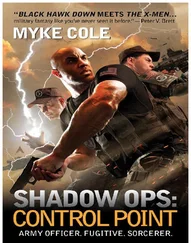Mack Maloney - Chopper Ops
Здесь есть возможность читать онлайн «Mack Maloney - Chopper Ops» весь текст электронной книги совершенно бесплатно (целиком полную версию без сокращений). В некоторых случаях можно слушать аудио, скачать через торрент в формате fb2 и присутствует краткое содержание. Город: Naples, FL, Год выпуска: 2011, ISBN: 2011, Издательство: Berkley, Жанр: Боевик, на английском языке. Описание произведения, (предисловие) а так же отзывы посетителей доступны на портале библиотеки ЛибКат.
- Название:Chopper Ops
- Автор:
- Издательство:Berkley
- Жанр:
- Год:2011
- Город:Naples, FL
- ISBN:978-1-61232-148-6
- Рейтинг книги:3 / 5. Голосов: 1
-
Избранное:Добавить в избранное
- Отзывы:
-
Ваша оценка:
- 60
- 1
- 2
- 3
- 4
- 5
Chopper Ops: краткое содержание, описание и аннотация
Предлагаем к чтению аннотацию, описание, краткое содержание или предисловие (зависит от того, что написал сам автор книги «Chopper Ops»). Если вы не нашли необходимую информацию о книге — напишите в комментариях, мы постараемся отыскать её.
Chopper Ops — читать онлайн бесплатно полную книгу (весь текст) целиком
Ниже представлен текст книги, разбитый по страницам. Система сохранения места последней прочитанной страницы, позволяет с удобством читать онлайн бесплатно книгу «Chopper Ops», без необходимости каждый раз заново искать на чём Вы остановились. Поставьте закладку, и сможете в любой момент перейти на страницу, на которой закончили чтение.
Интервал:
Закладка:
So Smitz closed his eyes and for the first time in years, actually whispered a small prayer.
And when he looked down at his laptop screen again, the little green light was blinking.
He began typing madly, nearly forgetting to hit the scramble-mode button first. He quickly gave the unit’s present position, then briefly reviewed what had happened. The raid on the Ranch, the empty prison, the dead Americans. He covered the details of their escape from the mountain in a few succinct words, and made no mention of his suspicions that the entire operation had been compromised. He concluded by asking for further instructions as soon as possible.
Then he hit the Send button.
Then he sat back to wait.
Smitz’s message beamed up directly from his modem to a top-secret military satellite called the Red Door 3, some five hundred miles above the Earth. It was then bounced off no less than four other communications satellites, before being sent down to CIA headquarters in Langley, Virginia.
No human ever responded to Smitz’s message, though. A computer had been awaiting a transmission—any transmission—from the unit, and now that it had arrived, the computer was sending back a response that had been entered into its hard drive several hours before.
The message told the unit to proceed to a point on the map known as El-Saad Men. This was an abandoned Iraqi Air Force base located in what was possibly the most barren part of the very barren central Iraqi desert.
Once there, the unit was to hide the choppers inside the most intact hangar on-site, and remain inside themselves until egress transportation arrived. The designated hangar would be easy to spot, as a large arrow was said to be painted on its roof.
This message made the return route up from Langley, to the four military bounce satellites, over to Red Door 3, and down to Smitz’s NoteBook in less than one minute.
The CIA man was stunned when he looked down sixty seconds later and saw his green light was blinking again. Nothing ever happened that fast. But when he read the message, he felt his heart lighten by a couple hundred pounds.
The words “egress transportation” were the most heartening part of the lone stark paragraph. It was official then. The unit was being pulled out of Iraq, a prospect that Smitz was sure would be greeted with much joy among the others. Had they accomplished their mission? No. Had they affected anything by coming deep into Iraq and raiding the Ranch? No. But would they be glad to get out of hostile territory after nearly forty-eight hours of pure nonstop anxiety?
Definitely.
Smitz shut down the laptop and began crawling through the sprawled Marines, telling them that things were looking up—unofficially, of course—and that they should get ready “for anything.”
He finally made his way up to the cockpit and asked the Army pilots to pull close to Norton’s Hind, now riding about 250 feet off the left nose.
The pilots nuzzled up to the chopper, and using a trouble light, Smitz sent a hasty Morse code message over to Norton. It took two attempts for the former fighter pilot to blink back that he understood. Then, in a burst of enthusiasm, he gunned the Hind and started wigwagging all over the sky. Obviously Norton was happy at the prospect of going home too.
Then Smitz blinked over the coordinates to the abandoned base at El Saad Men. A quick check of the aviation chart showed it was about twenty minutes of flying time away from their present location. Getting there would be a breeze compared to what they’d been through. Smitz asked Norton to fly ahead and scout out the location first.
Norton blinked back his reply, gunned the Hind’s engines again, and was off like a shot.
Then Smitz returned to his cramped seat in the cargo bay, and for the first time in forty-eight hours, actually fell asleep.
Chapter 27
El-Saad Men was an air base—or it used to be—located in the Tajji section of the central Iraqi desert, near the edge of Tharthar wadi.
Built a few months before the start of the Gulf War, it was little more than a pair of runways, a dozen support buildings, and three hangars. It had been designed for use as an alternative base for Iraqi fighters to transit to— a haven after a day of battle. But the base was knocked out the first night of the war by French fighters dropping Chaparral runway-busting bombs. Several times thereafter it was the target of follow-up Coalition air strikes.
Now El-Saad Men was a ghost town, literally. The runways were still cratered, and indeed only one hangar remained intact. The rest were just piles of rubble, victims of precision bombs dropped nearly a decade before.
This was the desolate scene Norton came upon when he reached the coordinates given to him by Smitz. At once he knew the base was the perfect place for the egress pickup. They could easily hide the choppers inside the last hangar standing—the one with the big arrow on top of it—and no one would know they were there unless they came up and knocked on the front door.
Still, he swept over the abandoned base several times, making sure there was no unfriendlies around; making sure there were no hidden weapons painting him. Once he was certain of this, he turned back and met the rest of the unit about fifteen miles east of the abandoned base. He pulled up alongside Truck One and delivered a nav light Morse code message.
“Looks good,” he blinked. “Suggest we put down ASAP.”
Inside of fifteen minutes, they had done just that.
They landed with no problems, and the huge choppers were pushed inside the last remaining hangar. It was a tight fit, but with some creative angling, all four finally squeezed in.
Now all they had to do was wait. And pray.
Ricco and Gillis were still in bad shape. The SEAL doctors had treated them throughout the escape flight, giving them oxygen and bandaging the multitude of wounds both men had sustained in the crash landing on the mountain. They had been taken out of their fuel-drenched flight suits and put into spares rounded up from others in the unit. Both pilots were now lying on makeshift stretchers, clad in Army T-shirts, Marine pants, and Air Force underwear.
Only now were they able to tell their tale to Smitz, Norton, Delaney, and Chou.
Though the Hook had developed engines problems en route, their refueling went well, they said. But then the ArcLight gunship showed up and blew the C-130 refueler out of the sky, taking the Hook down with it—or so it must have appeared. The chopper was mortally wounded and going down fast. But that was when Ricco did a very strange thing: He turned off the Hook’s one good engine about five thousand feet from impact. Killing the engine allowed the rotor’s kinetic motion to level them out—an old chopper trick Ricco had somehow picked up. It saved their lives. Once the chopper was stable, he was able to restart the engine, and it gave them enough power to stay airborne—but just barely. It was all they could do to keep the chopper at two hundred feet altitude.
They made the dash back to the Bat Cave, flying perilously low over villages, highways, army encampments. Thus their rather spectacular arrival back at the not-so-hidden mountain base. Everything was rather foggy after that.
This tale took about twenty minutes to tell. Neither man could get out a complete sentence without requiring a fix from the SEALs’ emergency oxygen tank. Ricco was especially woozy.
After hearing the story, Norton pulled Delaney away from the rest of the group.
“Well, what do you think?” he asked his partner.
“I think they’re delirious,” Delaney told him. “Do you really believe those two have all that in them?”
Читать дальшеИнтервал:
Закладка:
Похожие книги на «Chopper Ops»
Представляем Вашему вниманию похожие книги на «Chopper Ops» списком для выбора. Мы отобрали схожую по названию и смыслу литературу в надежде предоставить читателям больше вариантов отыскать новые, интересные, ещё непрочитанные произведения.
Обсуждение, отзывы о книге «Chopper Ops» и просто собственные мнения читателей. Оставьте ваши комментарии, напишите, что Вы думаете о произведении, его смысле или главных героях. Укажите что конкретно понравилось, а что нет, и почему Вы так считаете.












